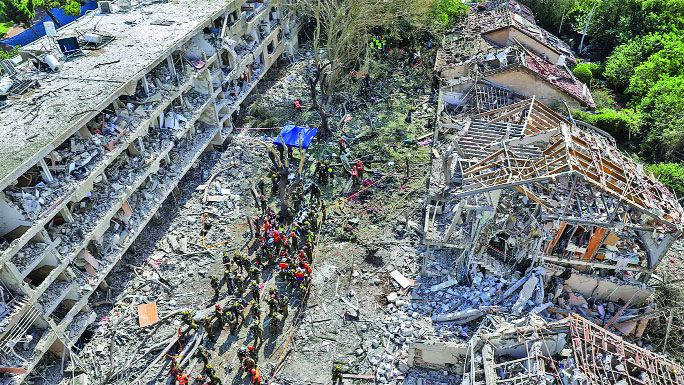Israel’s decision to attack Iran will be marked as the starting point of a deep escalation of tensions in the Middle East. The attack has opened a new and more volatile chapter in Middle Eastern geopolitics.
Israel’s military operation, codenamed “Rising Lion,” has brought direct conflict between Israel and Iran to a head. Iran is responding with drones and ballistic missiles. This response was not only expected by Iran, but also politically imperative for its deterrence and national prestige.
This situation threatens to create a cycle of violent conflict that will trap both countries in long-term instability.
Israel has argued that the strike was a preemptive strike to destroy Iran’s nuclear capabilities. But analysts are skeptical that Israel can achieve this goal without U.S. support. This is because Iran has built nuclear facilities like Fordo, which are located deep underground. Attacking such facilities would require the “bankruptcy” technology that the United States possesses.
Instead of stopping Iran’s nuclear ambitions, Israel’s attack could lead to its complete withdrawal from the Nuclear Non-Proliferation Treaty (NPT). Iran could follow North Korea’s path to openly developing nuclear weapons.
Iran has already increased its uranium enrichment program to 60 percent purity. It has also announced the establishment of new enrichment facilities. As a result, Iran is moving forward with its nuclear program at an unstoppable pace.
The Israeli attack also jeopardized ongoing nuclear talks between the United States and Iran, which were scheduled to begin within days of the Israeli attack.
While Washington has officially denied any involvement in the Israeli attack on Iran, Tehran widely believes that the United States was involved. As a result, Tehran may view the United States as an ally of Israel, which could complicate diplomatic efforts. On the other hand, if Iran attacks American assets in the Middle East, the US military could also be directly involved in the war.
Several Gulf countries, which seek economic diversification and regional stability, have expressed deep concern over Israel’s military campaign in Iran. The governments of these countries have expressed fears that the war could spread to a wider scale. They have advocated for de-escalation and a diplomatic solution.
Meanwhile, there is a growing tendency to see Israel as a major power in the Middle East. This could give rise to a new but fragile alliance centered around Israel. This would create new complications in the foreign policy of Arab countries, because public opinion in these countries is strongly opposed to Israeli aggression.
The ostensible goal of Israel’s military strategy is to destroy Iran’s military and nuclear leadership. While Tehran has so far been able to show resilience in the face of Israeli attacks, ongoing economic sanctions and internal unrest could further destabilize Iran.
On the other hand, Israel is also beset by various crises. They have been fighting in Gaza for more than 600 days. This is increasing their military spending. Political divisions within Israel are deepening. And the government has been accused of prolonging the war for personal political interests. As a result, frustration is growing in Israel. The stalemate over the hostage release and Israel’s position in the international arena are gradually weakening.
Rather than stopping at minor conflicts, Israel’s long-term strategic goal is to change the geopolitical landscape of the entire Middle East, weaken the “resistance coalition” and consolidate Israeli dominance. Although Hamas and Hezbollah are weak, these groups are still active. In this situation, if the United States directly gets involved in the war on Israel’s behalf, the threat of a major war in the Middle East is high.
The economic impact of this war is also huge. Oil prices are on the rise. The threat of disruption to vital shipping lanes like the Strait of Hormuz could put global trade at risk.
Israel’s invasion of Iran and the massacre in Gaza have sparked widespread public outrage throughout the Arab world. Public support for normalizing relations with Israel (even in countries that have signed the Abraham Accords) has plummeted. It is worth noting that Arab public trust in Western powers has declined significantly since October 2023.
The protests that have swept across the Arab world in recent months may not have brought down the region’s authoritarian rulers, but they are disrupting Arab political decision-making. To keep their people calm, Arab countries are having to recalibrate their foreign policy.
Iran could respond in a variety of ways to restore its credibility, including cyberattacks, attacks on Western military bases, or disruptions to maritime trade. Such a cycle of reactions could eventually draw major powers like Russia and China into the conflict.
Any attempt to isolate or dismantle Tehran could backfire. If Iran were to fragment along ethnic lines (Kurdish, Arab, Baloch, Azerbaijani, etc.), the situation there could be similar to post-Gaddafi Libya or post-Saleh Yemen. Terrorist groups could rise in anarchy. Such a situation could allow international terrorist groups like al-Qaeda to flourish there.
The Middle East is already reeling from the Israeli massacre in Gaza.
Israeli military operations have already made weak states in the Middle East more vulnerable. The vacuum created by the weakening of central authority in these states has strengthened non-state armed groups.
While Israel calls this war against Iran a war to mitigate the nuclear threat, its underlying goal is to reshape the power structure of the Middle East in favor of Israeli dominance, at the cost of public outrage, the weakening of Arab states, and the rise of extremists.
Now the entire Middle East is on the path of re-militarization. Trust in diplomacy is collapsing, divisions are growing. This raises the prospect of long-term instability. Development plans are being thwarted, alliances are breaking down, and the risk of major war is growing.

